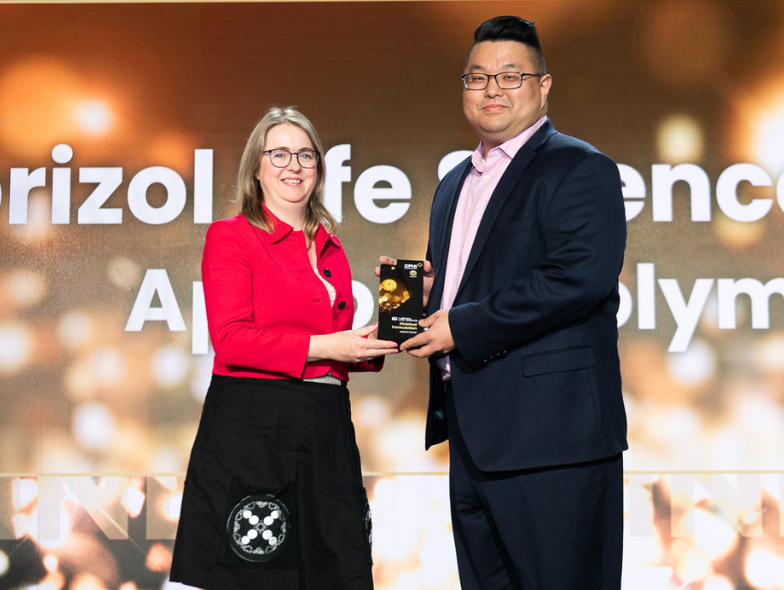CPHI Pharma Awards 2023 – Finished Formulation Winners: Lubrizol Life Science Health

After another year of impressive nominations for the CPHI Pharma Awards our winners were announced at CPHI Barcelona in October. In this series of interviews, we speak to the teams behind the award-winning projects, concepts, and technologies.
The winner for the Finished Formulation category was Lubrizol Life Science Health, for their Apisolex™ polymer technology. The Apisolex™ polymer is the latest solubility-enhancing excipient to be launched specifically for parenteral use in decades. Comprised of building blocks naturally occurring in the body, the poylmer is an exceptionally safe technology. Nick DiFranco of Lubrizol Life Science Health spoke about the win.
Please can you give some background to Lubrizol Life Science Health and the aims and goals of the company?
Lubrizol Life Science drew on its 40+ year legacy of developing innovative and dependable solutions to commercialise the Apisolex™ polymer and meet the need for effective new excipient options. As such, the polymer’s introduction into the market provides drug developers with the necessary tools to continue to develop and create novel and effective parenteral drugs in key areas such as oncology.
You won the ‘Finished Formulation’ prize for your Apisolex polymer technology – please can you tell us a little more about this project?
Approximately 60% of potential active pharmaceutical ingredients (APIs) under development, and more than 40% of those in reformulation, are poorly water soluble. This is a substantial hurdle for many drug developers and can either stop or impede the advancement of promising or potentially life-changing therapeutics from reaching the market.
Excipients have always played an important role in addressing solubility challenges in drug development. However, in the field of parenteral drug delivery, traditional solubilisers have several shortcomings including poor efficiency and negative side effects for patients.
Apisolex polymer was specifically developed to encapsulate and solubilise hydrophobic small molecule drugs, offering high drug loading and solubility increases of up to 50,000-fold. The technology is safe for parenteral use and amenable to simple, scalable formulation techniques.
Formulating challenging drug candidates with Apisolex polymer enables both the development of new molecular entities that are not served by traditional solubilisers as well as improvements on existing drug products.
The polymer family is also protected by strong, composition of matter patents which can be utilised for both new molecular entities and drug repurposing via the 505(b)(2) pathway.
With Apisolex polymer, Lubrizol hopes to rescue challenging compounds from solubility limitations and provide a new option for drug formulators.
What challenges have you encountered in developing the Apisolex polymer and how did you overcome these?
We’ve taken on the challenge of bringing Apisolex polymer from benchtop to commercial scale, which has required significant time and resources. However, thanks to our 40+ years of experience manufacturing pharmaceutical excipients, we understand how to tackle challenges with GMP manufacturing, scale-up, and regulatory documentation. We have a long history of partnering with our customers to provide critical information and support their drug product filings from development through launch, and we are well on our way towards a robust technical data package for Apisolex polymer.
Apisolex polymer technology represents a new step in excipient production, how will this change drug formulation in more difficult areas of medicine and ultimately benefit patients?
Apisolex polymer is a safe, injectable-grade poly(amino acid)-based excipient that provides formulators with methods to enhance the solubility of hydrophobic BCS Class II and IV APIs by up to 50,000-fold.
Apisolex polymer uses straightforward, scalable formulation techniques and leverages micellar encapsulation to dramatically enhance the solubility of otherwise insoluble APIs. The patented Apisolex technology enables differentiated formulations for both new molecular entities (NMEs) and marketed APIs.
Additionally, Apisolex polymer offers oncology, CNS, and high-value orphan drug formulators the necessary tools to unlock the potential of previously hard-to-formulate APIs. Oncology drugs make up nearly 30% of all parenteral new molecular entities in development, and many classes of these drugs suffer from poor solubility. Apisolex polymer is well positioned to enable the development and/or improvement of these much-needed drug products.
What does winning the award mean to you and how will it help you as a company?
As a novel excipient developer, we understand the challenges of introducing a new technology to the pharmaceutical industry and overcoming hesitation amongst our customers. One of our main goals today is ensuring that formulators know about our technology and connect with Lubrizol when they are struggling to overcome solubility challenges.
For difficult small molecules in the pipeline, educating the market about Apisolex polymer could mean the difference between a successful drug product and a candidate that never makes it off the bench.
Winning the CPHI Finished Formulation award is a great way to bring awareness to our important new technology and our desire to help bring more life-saving medications to market. We hope that this exposure will lead to further connections and opportunities to support innovators in the pharmaceutical space.
What does the future hold for Lubrizol? Are you working on more revolutionary formulations?
We launched our two novel solubility enhancing excipients in 2022 – Apisolex polymer for injectables and Apinovex polymer for oral solid dosage forms. We are 1 ½ years into the process of bringing these novel technologies to market, and we’re proud of the work we’ve done highlighting the benefits of these polymers.
Going forward, we will continue to generate key technical and safety data (following the guidance laid out in FDA’s PRIME pilot programme), identify additional partners to test our polymers, and optimise the manufacturing process to support commercialisation. Our efforts will ensure that we can reliably supply GMP material for clinical and commercial use, as well as regulatory documentation (including Drug Master Files) to support our customers’ drug filings for years to come. If you are struggling with poorly soluble APIs, we encourage you to reach out and speak with our team of experts today.
About Nick DiFranco
 Nick DiFranco, MEM, is the Global Market Segment Manager for Oral Drug Delivery & Novel Excipients at Lubrizol Life Science Health. In his role, Nick coordinates a multi-disciplinary team offering excipients and services for controlled release and solubility enhancement in oral solids and liquids, including Carbopol® and Apinovex™ polymers. Prior to this role, Nick held positions as an Applications Scientist and Market Manager at Lubrizol supporting long-acting drug delivery and CDMO services. Nick holds a B.S. in Biomedical Engineering (Biomaterials focus) and a Master of Engineering and Management degree from Case Western Reserve University.
Nick DiFranco, MEM, is the Global Market Segment Manager for Oral Drug Delivery & Novel Excipients at Lubrizol Life Science Health. In his role, Nick coordinates a multi-disciplinary team offering excipients and services for controlled release and solubility enhancement in oral solids and liquids, including Carbopol® and Apinovex™ polymers. Prior to this role, Nick held positions as an Applications Scientist and Market Manager at Lubrizol supporting long-acting drug delivery and CDMO services. Nick holds a B.S. in Biomedical Engineering (Biomaterials focus) and a Master of Engineering and Management degree from Case Western Reserve University.

Position your company at the heart of the global Pharma industry with a CPHI Online membership
-
Your products and solutions visible to thousands of visitors within the largest Pharma marketplace
-
Generate high-quality, engaged leads for your business, all year round
-
Promote your business as the industry’s thought-leader by hosting your reports, brochures and videos within your profile
-
Your company’s profile boosted at all participating CPHI events
-
An easy-to-use platform with a detailed dashboard showing your leads and performance